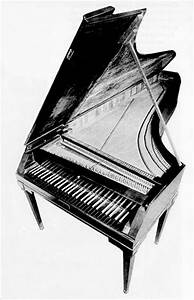 |
| J.S. Bach |
She's right. The harpsichord can't sustain long notes "like the modern piano," though it can sustain significantly longer than many modern pianists seem to think. This is based on my observation of how short and detached harpsichord imitators of today play.
 |
| Harpsichord |
 |
| Fortepiano |
Articulation is of course a main consideration in Bach. How we treat the differences between long and short notes is crucial to bringing the music to life and giving it its Baroque flavor. Some rules of thumb (no pun intended) might be to play conjunct notes more connected and disjunct notes more detached. Two-note slurs are virtually always realized with emphasis on the first note, relaxing on the second. This can be achieved with sound (louder/softer) or by length of notes (longer/shorter). The last note in a group of conjunct notes might be articulated. These are, of course, just general guidelines. As CPE Bach writes: "If it doesn't sound good, don't do it." In the final analysis, our expressive decisions are based on taste, for which there is often no accounting—and study.
In the introduction to the Inventions and Sinfonias Bach writes: "Those desirous of learning... [will] ABOVE ALL [my emphasis] achieve a cantabile style in playing." Length of notes relative to one another becomes more crucial in quick, characterful pieces; it is less so in slower arias. We get to decide if we want to imitate the harpsichord, as many do, or play the piano using its resources, which I personally believe Bach would applaud. As long as the counterpoint isn't swamped with pedal, the piece will still sound like Bach. My personal view is that if you want "authenticity," play the harpsichord, which I have done on occasion. I prefer the piano.
I came across a comparison of these instruments, which includes the clavichord, reportedly Bach's favorite: Listen.
2 comments:
These are really great ideas in on the topic
of blogging. You have touched some fastidious points here.
Any way keep up wrinting.
Hi there to every body, it's my first pay a quick visit of this weblog; this blog
carries awesome and really excellent stuff designed for readers.
Post a Comment